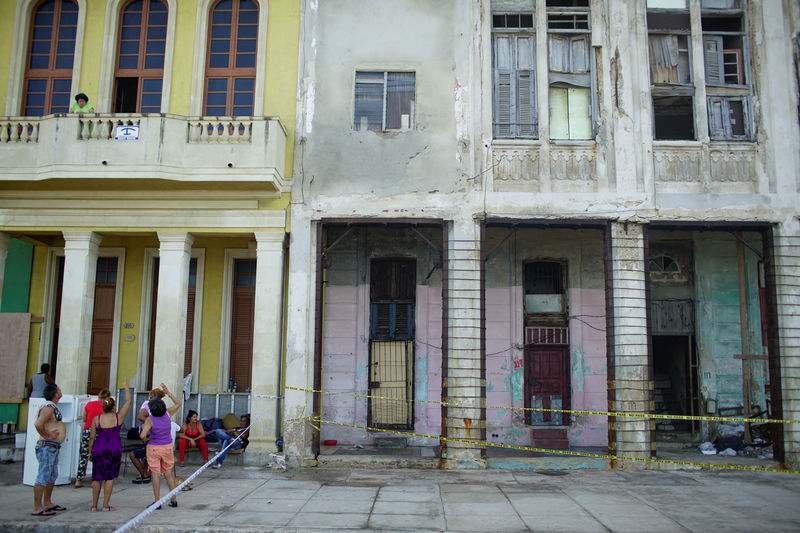By Sarah Marsh
HAVANA (Reuters) - Roydis Valdés' dilapidated home on Animas Street in the densely packed center of Old Havana had been declared uninhabitable by Cuba's Communist authorities years ago, his neighbors said.
After Hurricane Irma shook the Cuban capital - a crumbling architectural jewel of the Caribbean - Valdés and his brother were found under a collapsed wall, just two of the seven people killed by falling buildings on the island.
Havana's historic center, where baroque Spanish colonial-era palaces butt shoulders with sleek Art Deco apartment buildings, was already crumbling before it took a lashing from Irma - a visible reminder of the hardship caused by a 57-year U.S. trade embargo.
Residents fear the violent storm - the worst to hit the Cuban mainland since 1932 - will accelerate the city's decline.
While the eye of the hurricane did not reach the capital, tropical-storm force winds and heavy rains of its outer bands, as well as a storm surge, wrought havoc on its decrepit buildings.
Salty water from Irma's heavy rains that has seeped into the brick and mortar of the capital's buildings will worsen corrosion and likely cause a raft of new collapses, residents and architects warn.
"Now when the sun comes out, that's when things will really start to fall apart in Havana," said Berta Rodriguez, a 71-year-old pensioner who lives on Animas Street and knew Valdés and his brother well.
"We spent years asking the state to remove them from there," she said, crying. "The state has to answer for this."
Irma has shone an unwelcome spotlight on the Caribbean nation's housing problems at a tricky time for the government.
Already dealing with a cash crunch in the wake of a steep decline in aid from its key ally, Venezuela, Cuba also faces a political transition as President Raul Castro steps down next year, symbolizing the passing of the baton from the generation that led the 1959 Revolution.
Rodriguez, who evacuated to her son's sturdier home during the hurricane, says she has been asking the Communist authorities for a new home for more than 20 years, echoing the frustrations of many Havana residents.
After the Revolution led by Raul Castro's elder brother Fidel, the Cuban state confiscated many of Havana's grand historic buildings and distributed them to poor and middle-class families who over the years have divided them into ever-smaller units.
Maintaining those buildings in a punishing tropical climate, however, fell by the wayside as the Communist government prioritized universal healthcare and education, as well as building infrastructure in the impoverished countryside.
With state salaries averaging $30 per month and credit hard to get, Cubans say they do not have the money to fix up buildings themselves.
"A builder told me I need to repair the walls that are full of holes, but I couldn't find the cash," said Rodriguez, who suffers from chronic bronchitis made worse by her badly leaking ceiling.
About 4,400 cases of damage to housing were reported in the capital due to Irma, state-run media said on Thursday. Of those, authorities confirmed nearly 1,200 buildings were entirely or partially destroyed.
The city is working on restoring damaged roofs and preparing two shelters for families left homeless, the newspaper Granma added. But this will solve only part of a far greater problem.
HAVANA NEEDS MORE THAN 200,000 HOMES
The housing deficit in the nation of 11 million people rose last year by 30,000 to nearly 900,000 units, the government told parliament in July.
In Havana, it estimated a shortage of more than 200,000 homes.
The state had built 316,595 homes between 1990 and 2013, an effort that the president of the Construction Commission Santiago Lajes Choy told parliament was still "insufficient."
Litza Penalver, whose sister's family lives in the building on Animas street partially destroyed by Irma, said authorities want to get residents out now.
"They want to demolish it, to cover up their errors," she said. "They want to oblige us to stay in a large shelter and wait (for a new house) but the wait can last 30 years - Cuba doesn't have the resources."
Many Havana residents say they would prefer to stay in their decrepit homes, no matter how dangerous, rather than move to large shelters that offer no privacy.
Still, with the rainy season ongoing, many worry that more hurricanes could hit before it ends in November.
While Irma has exacerbated frustration with Cuba's housing problems, even dissidents say it is unlikely to fuel outright opposition to the government.
"There might be more spontaneous, isolated expressions of discontent," said Jose Daniel Ferrer, leader of the Patriotic Union of Cuba (UNPACU), one of the island's largest dissident groups. "But not organized protests with clear political aims given the high level of repression at the moment."
Rodriguez, Penalver and others on Animas Street said theirs was not a political problem and noted they were strong supporters of the Revolution that toppled right-wing dictator Fulgencio Batista in 1959 and subsequently provided free healthcare and education to ordinary Cubans.

"I love my country," said Penalver, adding she had a Spanish passport but chose to live in Cuba. "I'm not looking for political problems. I'm looking for solution to the housing issue."